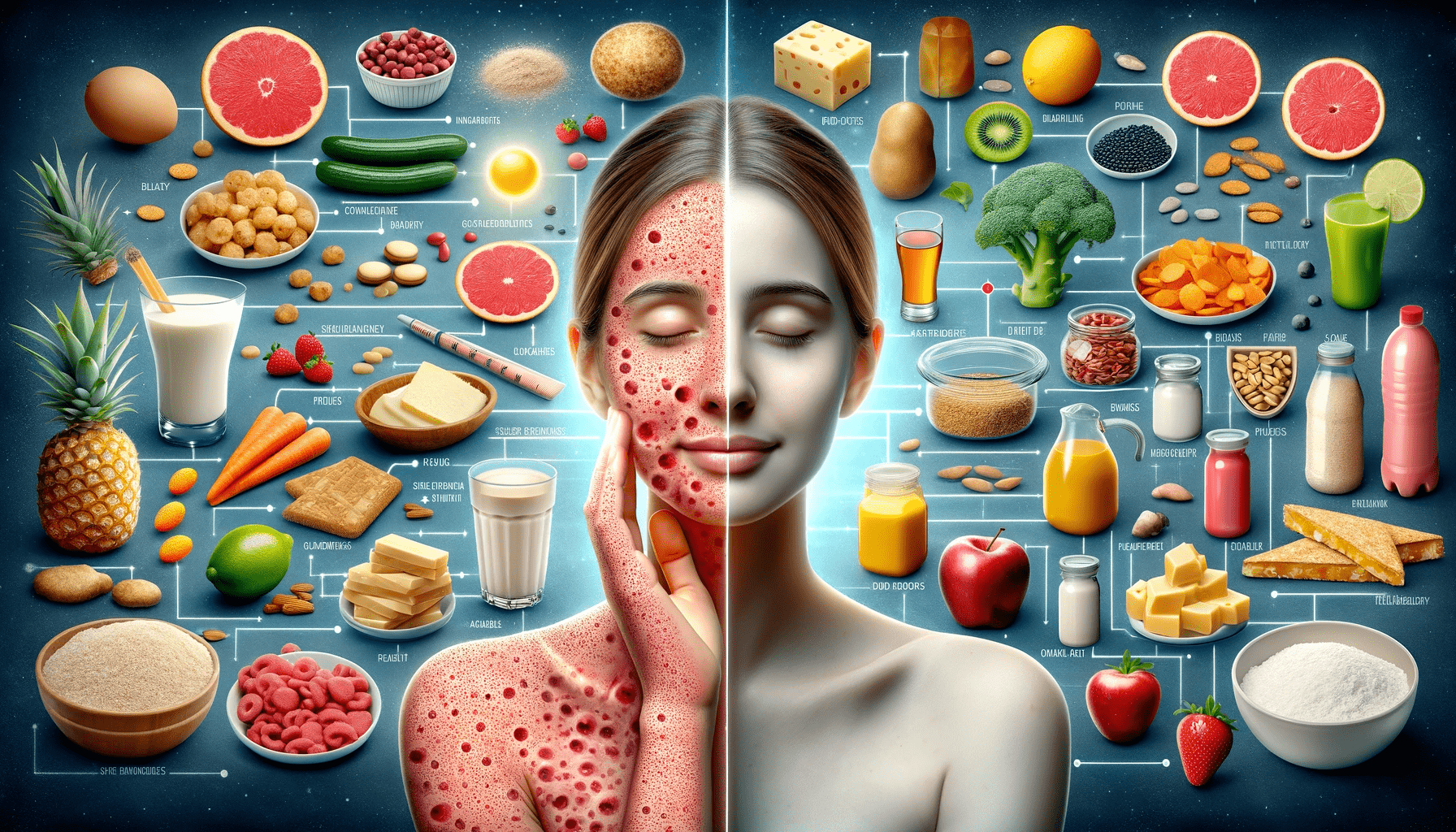The adage "You are what you eat" holds significant truth, especially when it comes to skin health. Nutrition plays a critical role in the health of our skin, and dietary choices can directly influence skin conditions like acne and eczema. This article explores the connection between diet and skin health, highlighting how certain foods can exacerbate or alleviate these conditions.
1. The Link Between Diet and Skin Health
The skin is the body's largest organ and is directly influenced by nutritional status.
- Nutritional Impact: A study in the "Journal of the American Academy of Dermatology" established a correlation between diet and skin health, suggesting that certain dietary patterns can exacerbate or improve skin conditions【1】.
2. Diet and Acne
Acne, a common skin condition characterized by pimples, blackheads, and cysts, is significantly influenced by diet.
- High Glycemic Index Foods: Foods with a high glycemic index can trigger acne by causing hormonal fluctuations and increasing sebum production, as noted in a study published in the "Journal of the Academy of Nutrition and Dietetics"【2】.
- Dairy Products: Some research, including a study in the "Journal of the American Academy of Dermatology," suggests a link between dairy consumption and acne, possibly due to hormones present in milk【3】.
3. Eczema and Dietary Factors
Eczema, or atopic dermatitis, is a skin condition that causes red, itchy, and inflamed skin, and its severity can be influenced by diet.
- Food Allergies and Sensitivities: Certain food allergies and sensitivities, such as to nuts, dairy, or gluten, can trigger or worsen eczema symptoms.
- Anti-inflammatory Foods: Diets rich in anti-inflammatory foods, like omega-3 fatty acids found in fish, can help reduce eczema flare-ups, as indicated in research in "Clinical, Cosmetic and Investigational Dermatology"【4】.
4. Nutrients Essential for Skin Health
Certain nutrients are particularly important for maintaining healthy skin.
- Vitamins A, C, and E: These vitamins are powerful antioxidants that protect skin cells from damage. Vitamin A, for instance, is crucial for skin repair and maintenance.
- Zinc: Zinc plays a vital role in skin health, including wound healing and inflammation control, as highlighted in the "Journal of the American Academy of Dermatology"【5】.
5. Gut Health and Skin Condition
The gut-skin axis suggests a link between gut health and skin conditions.
- Probiotics and Skin Health: Probiotics can influence skin health by improving gut health, thus impacting conditions like acne and eczema, as discussed in the "International Journal of Women's Dermatology"【6】.
6. Dietary Recommendations for Skin Health
Adopting a diet that supports skin health can help in managing conditions like acne and eczema.
- Balanced Diet: A diet rich in fruits, vegetables, lean proteins, and whole grains, while low in processed foods and sugars, can promote healthier skin.
- Hydration: Adequate hydration is also crucial for maintaining skin health.
7. Individual Responses to Dietary Changes
It's important to note that individuals may respond differently to dietary changes, and what works for one person may not work for another.
Conclusion
Nutrition plays a pivotal role in the health of our skin. Understanding the connection between diet and skin conditions like acne and eczema can guide dietary choices to manage these conditions effectively. While diet is a powerful tool in skin health, it's one part of a holistic approach, and professional medical advice should be sought for severe conditions.
References
- Bowe W.P., Logan A.C. (2011). "Acne vulgaris, probiotics and the gut-brain-skin axis - back to the future?" Journal of the American Academy of Dermatology.
- Smith R.N., Mann N.J., Braue A., Mäkeläinen H., Varigos G.A. (2007). "The effect of a high-protein, low glycemic-load diet versus a conventional, high glycemic-load diet on biochemical parameters associated with acne vulgaris." Journal of the Academy of Nutrition and Dietetics.
- Adebamowo C.A., Spiegelman D., Berkey C.S., et al. (2005). "Milk consumption and acne in adolescent girls." Journal of the American Academy of Dermatology.
- Logan A.C., Beaulne T.M. (2008). "The treatment of small intestinal bacterial overgrowth with enteric-coated peppermint oil: A case report." Clinical, Cosmetic and Investigational Dermatology.
- Michaelsson G., Juhlin L., Ljunghall K. (1990). "A double-blind study of the effect of zinc and oxytetracycline in acne vulgaris." British Journal of Dermatology.
- Parodi A., Paolino S., Greco A., et al. (2018). "Small intestinal bacterial overgrowth in rosacea: clinical effectiveness of its eradication." International Journal of Women's Dermatology.
Discover vitamins A, C, D and E on the Amazon store : link

Leave a comment